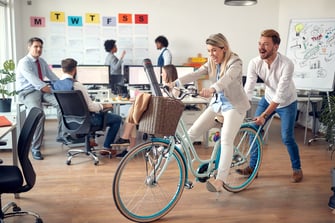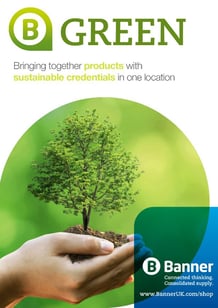
There has been a lot of talk around sustainability, and for some people it can become overwhelming.
But with environmental focus becoming something we need, rather than want, to implement into a business it can be a mammoth job to tackle. So where do you begin?
There are a lot of areas of focus in creating a more eco-conscious workplace - from everyday tasks like remembering to turn your monitors and the lights off, to keeping recycling bins in the breakrooms and kitchens. However, there are also areas of sustainability that require a longer period of time to implement, like a greener commute to work or switching to more sustainable products.
Here are 4 easy ways to you create a more sustainable workplace:
Swap out plastics, especially bottles!
Many types of plastics are recyclable, but it can still take up to 500 years for plastic to fully decompose. To put this in perspective, if someone were to drop plastic on the ground while Henry VIII was on the throne that piece of plastic could still be around today[1]. Despite this, and the war on plastic, only 45% of plastics in the UK get recycled, which means 55% still ends up in landfills or the Ocean[2].
Cans are considered to be a better alternative to plastics, this is because it takes 95% less energy to recycle a can than to make a new one. As well as this, cans are 100% recyclable, and can be recycled numerous times without loss of quality. Unfortunately, a lot of supplies come in plastic packaging and containers rather than tin or aluminium as it functions better, not only for ease of use, but for safety reasons[3].
Even though cans are the better alternative to plastics, it is still important to recycle both products. If you don’t have recycling bins at your office or facilities, then it may be best to contact whoever is responsible for waste management. However, if you want to move away from using plastics and cans in your everyday life, here are a few suggestions: Use reusable metal water bottles instead of using plastic bottles if you travel a lot, most cafes will agree to fill up one of these bottles for free, or if you are office based it can use a re-fillable bottle or a cup. Similarly, instead of using plastic bags for lunches, why not use reusable containers like lunch or bento boxes.
Sometimes even the smallest change can have the biggest impact.
Reduce energy
You would likely be surprised with the amount of impact energy and water usage can have on the environment. With everything from thermal pollution to climate change and water pollution to take into consideration, what can we do to reduce our energy and water usage to help the environment?
 Lights are a major source of energy usage in a workplace, however if you are using the wrong types of lighting in your office not only can this cause risks like eye strain and loss of concentration but can be a source of both light and thermal pollution. Luminescent lightbulbs can let off heat without you realising and standard fluorescent tube lights in schools and offices can also contain toxic chemicals and elements including mercury, which can leak out when they are sent to landfill and contaminate the environment. On the other hand, LEDs are non-toxic[1] and use at least 75% less energy than your standard lightbulbs[2], so it’s worthwhile considering switching to this alternative.
Lights are a major source of energy usage in a workplace, however if you are using the wrong types of lighting in your office not only can this cause risks like eye strain and loss of concentration but can be a source of both light and thermal pollution. Luminescent lightbulbs can let off heat without you realising and standard fluorescent tube lights in schools and offices can also contain toxic chemicals and elements including mercury, which can leak out when they are sent to landfill and contaminate the environment. On the other hand, LEDs are non-toxic[1] and use at least 75% less energy than your standard lightbulbs[2], so it’s worthwhile considering switching to this alternative.
As well as updating the lighting there are other sources of energy which you may not think about, such as monitors and laptops or dishwashers. Turning off monitors and lighting at the end of the day is a great way to conserve power, and it can also be good to turn off you monitor when you take a lunch break. Dishwashers use up both energy and water, which can be ok when you have hundreds of people in your office, but if you only work in a small office putting the dishwasher on every night might not be worth the waste of water and electricity.
Encourage a greener commute
Often when someone mentions a greener commute, we think of cycling to work, getting the bus, car sharing and even walking. However, with the rise of electric vehicles there has been more of a focus on greener forms of travel.
Electric vehicles have lower running costs, reduce noise pollution, prevent you from getting tariff charges in high congestion areas and are overall better for the environment as they won’t produce greenhouse gases. Although these are all positive benefits to owning an electric vehicle, there are also downsides, mainly with how long the electric charge holds, and charging stations. A typical electric vehicle can take a long time to charge from empty to full – although a lot of people choose to top their electric vehicles up a bit at a time, it can still take hours to charge, which can affect the length of journeys, especially when visiting customers. However, electric vehicles are more cost effective, often being around 25% cheaper than the price of petrol and can be more convenient with the addition of being able to charge your car from home. If your workplace has charging points available to you, having an electric vehicle may be the green mode of transport for you.
 Cars however can be an expensive investment, so what are the alternatives to electric or hybrid cars? One of the options is to cycle to work. Cycling is a great form of exercise as well as a cheap alternative to driving. Not only is it more eco-friendly, but cycling can sometimes be faster than driving as you are less likely to get caught in traffic. As well as this, if your business runs a bike to work scheme, you can get money to invest into a bike or cycling accessories. Alternatively, if you live close enough to your place of work, you could also consider walking, or other modes of transport like buses.
Cars however can be an expensive investment, so what are the alternatives to electric or hybrid cars? One of the options is to cycle to work. Cycling is a great form of exercise as well as a cheap alternative to driving. Not only is it more eco-friendly, but cycling can sometimes be faster than driving as you are less likely to get caught in traffic. As well as this, if your business runs a bike to work scheme, you can get money to invest into a bike or cycling accessories. Alternatively, if you live close enough to your place of work, you could also consider walking, or other modes of transport like buses.
As well as cycling or getting the bus, you and some colleagues could do a car share to the office. In order to car share you don’t need to use a service such as uber, you can take it in turns with co-workers to each drive each other, or for one colleague to drive a group of colleagues to and from work. There are many ways of car sharing, which would not only save money on petrol or diesel but can help you to bond and form closer relationships with those you work with. Check with your company beforehand if you are planning on car sharing, as some companies reserve spaces closer to the office for those who car share.
Make the switch to greener products
Choosing and using the right products is invaluable to your business, as it will help you to meet your organisation’s sustainability goals and targets. Finding products that offer enhanced sustainable and ethical credentials can mean you are making strong sustainable choices, benefiting both you and the environment. Green products often have Industry recognised standards demonstrating their high commitment to sustainability and ethical trading, being certified by organisations such as ECOlabel, Energy Star, Blue Angel, Nordic Swan, and many others.

A green product isn’t just a product that achieves these green credentials. At Banner we have a range of Green Choice products that don’t have certifications or accreditations but have been self-claimed. Banner have worked with reputable suppliers to ensure that these products meet a suitable criterion informed by IOS14021, the guidance standard that helps to ensure claimants avoid green washing and remain relevant.
So, where do you start when making the switch to green products. It may seem like a daunting challenge, but when switching to green products making just a single change can still make a difference. Swapping from disposable products like plastic cutlery and changing them to wood or metal alternatives or changing your cleaning and hygiene products to one with zero plastics, can make a difference.
More Information
For more information on making a switch to greener product, view our B Green catalogue.
To get in touch with us call your account manager, phone us on 0843 538 3311 or to become a customer email Contact.Banner@BannerUK.com.

